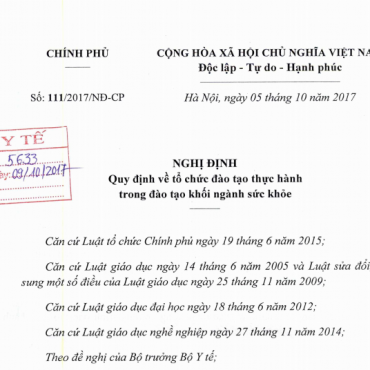Liên hệ tuyển sinh
Hợp tác Quốc tế
Changes to the Standards for Integrity and Independence in Continuing Medical Education
Changes to the Standards for Integrity and Independence in Continuing Medical Education
JAMA. 2021;325(18):1833-1834. doi:10.1001/jama.2021.0213
Trust is core to the value of accredited continuing education. Physicians and other health care professionals, patients, and the public must be able to trust that accredited education is delivering scientifically accurate content that is free from industry manipulation and influence. Although the interests of health care and industry sometimes diverge, both are legitimate, and collaboration between health care professionals and industry can advance patient care.
Because health care professionals serve as the legally mandated prescribers of medications, are responsible for the use of many devices, and are trusted authorities when advising patients, educators must protect the learning environment from industry influence to ensure the profession remains true to its ethical commitments. In addition to the variety of other expectations for learning and quality improvement activities overseen by the accredited continuing medical education (CME) system, it is the guarantee to learners that educational material is based on science and best practice and is free from promotion and marketing that most separates accredited education from myriad other materials that try to influence physicians’ behavior.
This foundational principle has been in place since 1992, when the Accreditation Council for Continuing Medical Education (ACCME) released standards governing interactions between CME and industry. The standards were developed in response to concerns from the government and the profession about the inappropriate influence of industry over education.1 In response to the growing prevalence and complexity of relationships between physicians and industry, the ACCME introduced more stringent requirements, particularly with regards to disclosure of conflicts of interest, in 2004. Over time, the ACCME standards have been adopted by accrediting bodies representing multiple health care professions in the US (eg, nursing, pharmacy), demonstrating broad agreement among the health care professions on how to maintain the integrity of an education system for the health care professional community. The standards have also been recognized by international accrediting and regulatory bodies,2 the government, and industry as an effective bulwark against industry efforts to promote to health care professionals. Data suggest that the standards have been effective in preventing commercial bias in CME without constraining the dialogue that facilitates discovery. Studies show low rates of perceived commercial bias for accredited CME activities and find no evidence that industry funding, when present, influences content or introduces bias in accredited activities.3,4 The same levels of perceived bias were reported for activities that did and did not receive commercial support, and commercially supported CME can provide clinically accurate medical content.3,4
Since the standards were last revised in 2004, the health care ecosystem has changed considerably, creating new challenges for protecting CME from industry bias. In response, the ACCME, in collaboration with the CME community and other accrediting bodies and regulatory agencies, engaged in a 2-year process of dialogue and consensus building to streamline, clarify, and modernize the standards and ensure that the accredited CME system delivers on its promise to facilitate quality and unbiased education to the profession in a changing health care environment.
Evolution Process
The process of review and revision was led by a task force representative of diverse perspectives, including accredited continuing education providers and the public. Following broad engagement with and feedback from accredited continuing education providers; other accrediting bodies, including state medical societies and accreditors representing multiple health professions; the US Food and Drug Administration; and the research and medical journal communities, the ACCME issued a draft set of standards in early 2020 and a final set in December 2020.5 The Standards for Integrity and Independence in Accredited Continuing Education have already been adopted by 6 accrediting bodies, including those who oversee the continuing education environment for nurses and pharmacists. Accredited CME providers are required to comply with the new standards by January 1, 2022. Compliance will be monitored using ACCME’s existing audit, remediation, and accountability framework. The key changes are described below.
Content Validity
With the proliferation of medical misinformation and disinformation, as well as questions about the validity of science, issues related to content validity are more important than ever. Requirements for clinical content validity have been included for many years in ACCME policy but were separate from the standards. In the new standards, content validity is the first standard, positioned to emphasize its importance.
The content validity standard states that all recommendations for patient care in accredited continuing education must be based on current science, evidence, and clinical reasoning while giving a fair and balanced view of diagnostic and therapeutic options. All scientific research used to support patient care recommendations must conform to the generally accepted standards of experimental design, data collection, analysis, and interpretation. To promote free scientific discourse while ensuring content validity, the standard clarifies that accredited continuing education is an appropriate and important place to discuss, debate, and explore new and evolving topics. These topics need to be identified as such. Education must not advocate or promote practices that are not, or not yet, adequately based on current science, evidence, and clinical reasoning. It is the responsibility of the CME provider to ensure content validity; furthermore, the ACCME's committee on content validity evaluates complaints and holds the CME providers accountable.
Disclosure Expectations
A key principle in the former and new standards is disclosure: all individuals involved in CME must disclose their financial relationships with industry to the accredited educational provider and, ultimately, to their learner colleagues. The new standards add more rigor to the disclosure process, requiring planners, faculty, and others involved in creating educational content to disclose all of their direct and indirect financial relationships with industry to the accredited provider of education. It is the accredited CME provider’s responsibility to determine which relationships are relevant (eFigure in the Supplement). This responsibility is an expansion of the accredited CME provider’s responsibility; in the previous standards, the responsibility for determining relevance lay with the individual planners or faculty. As illustrated by recent high-profile examples, physicians are not always accurate or consistent in determining or reporting the relevance of their relationships to industry.6 Placing responsibility on the accredited CME provider is intended to increase accountability and support greater consistency of disclosures. The requirement in the former standards that individuals disclose the financial relationships of their spouse or partner has been removed. As with the former standards, CME providers must take steps to ensure relevant financial relationships do not introduce bias into the education, such as recusal, conducting a peer review by persons without relevant financial relationships, or other methods chosen by the CME provider. The faculty and the entity providing CME are then responsible for disclosing the relationships to CME learners and communicating that all relevant relationships were effectively mitigated.
To facilitate learner-driven CME, the new standards enable nimble deployment of activities such as case conferences; conversations among peers; and self-directed learning, including learning from teaching, remediation, or personal development plans. Obtaining information about financial relationships and disclosure are not required for these activities because the opportunity to introduce industry bias is likely minimal.
As with the previous standards, industry employees or owners are excluded from any role as faculty or planners in accredited CME unless their contributions are limited to basic science, the CME is not related to any of the company’s business lines or products, or they are demonstrating a device. These exceptions are designed to facilitate the inclusion of expert professionals while ensuring the education is protected from manipulation by employees of industry. Defining who is an owner or employee has become more challenging because of the increasing complexity of relationships among physicians, institutions, and industry. For instance, when a medical school creates a biomedical startup entity, a physician who serves as faculty for the institution’s CME program may also serve in an executive role in the startup; when the startup begins a governmental regulatory approval process of the drug or device, that relationship is considered industry employment.
Other Requirements
The new standards are designed to protect learners from industry influence in other ways as well. Accredited education must be free of commercial bias and any form of marketing. Accredited CME providers must make all decisions regarding the receipt and disbursement of any financial or in-kind support from industry. Although less than 10% of all accredited CME in the US receives any support from industry, any industry support must be disclosed to learners. Faculty must not actively promote or sell products or services that serve their professional or financial interests. In addition, accredited CME providers must obtain consent from participants before sharing information about individual learners with companies that represent industry.
Conclusions
The fundamental principles of independence and integrity in the name and text of the new standards are intended to convey their critical importance in ensuring that accredited CME serves the public trust. Applying these principles to educational practice in ways that are meaningful and effective requires thoughtful, deliberate effort; consensus building; and commitment on the part of all involved. Each individual involved in CME has a role and responsibility in upholding these core principles. To fulfill its accountability as an accreditor, the ACCME will continue to monitor the evolving health care environment, collect and analyze compliance data, and facilitate research about the standards’ effectiveness. Whatever the challenges for all involved, these efforts are essential to help fulfill medicine’s contract with society to place the interest of patients first and provide safe, effective, and compassionate care based on best practice and evidence, not on promotion.
Corresponding Author: Graham T. McMahon, MD, MMSc, Accreditation Council for Continuing Medical Education, 401 N Michigan Ave, Ste 1850, Chicago, IL 60611 (gmcmahon@accme.org).
Published Online: April 15, 2021. doi:10.1001/jama.2021.0213
Conflict of Interest Disclosures: Dr McMahon reported receiving personal fees from the Accreditation Council for Continuing Medical Education as the CEO.
References
1.Kopelow M, Regnier K, Hosansky T. Instituting national standards for continuing medical education: the Accreditation Council for Continuing Medical Education. In: Wentz DK, ed. Continuing Medical Education: Looking Back, Planning Ahead. Dartmouth College Press; 2011:118-131.
2.Standards for substantive equivalency between CPD/CME accreditation systems. International Academy for CPD Accreditation. Accessed December 26, 2020. https://academy4cpd-accreditation.org/standards-for-substantive-equivalency-between-cpd-cme-accreditation-systems/
3.Steinman MA, Boscardin CK, Aguayo L, Baron RB. Commercial influence and learner-perceived bias in continuing medical education. Acad Med. 2010;85(1):74-79.PubMedGoogle ScholarCrossref
4.Cervero RM,, Gaines JK,. Is There a Relationship Between Commercial Support and Bias in Continuing Medical Education Activities? Accreditation Council for Continuing Medical Education; 2014.
5.Accreditation Council for CME announces new Standards for Integrity and Independence in Accredited Continuing Education. News release. Accreditation Council for Continuing Medical Education. December 10, 2020. Accessed December 26, 2020. https://www.accme.org/news-releases/accreditation-council-for-cme-announces-new-standards-for-integrity-and-independence
6.Ornstein C, Thomas K. Prominent doctors aren’t disclosing their industry ties in medical journal studies. and journals are doing little to enforce their rules. Propublica. December 8, 2018. Accessed December 26, 2020. https://www.propublica.org/article/prominent-doctors-industry-ties-disclosures-medical-journal-studies
Source:https://jamanetwork.com/journals/jama/fullarticle/2778925?guestAccessKey=4dada435-5470-4ed9-8dc1-051f2f83d9d3&utm_source=silverchair&utm_medium=email&utm_campaign=article_alert-jama&utm_content=etoc&utm_term=051121














